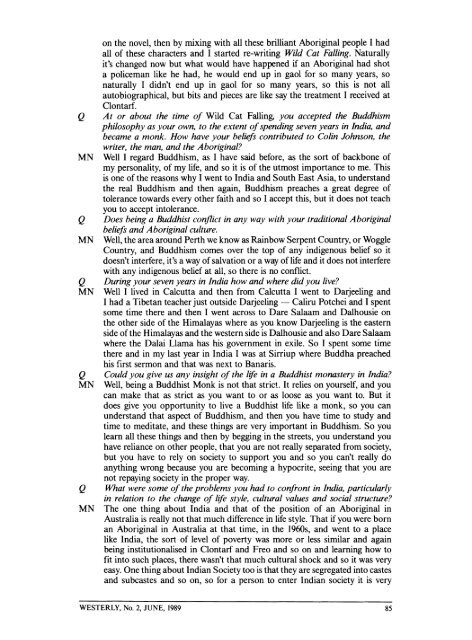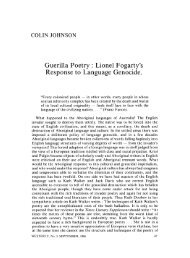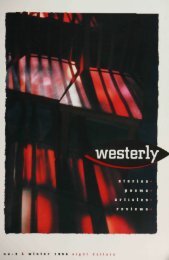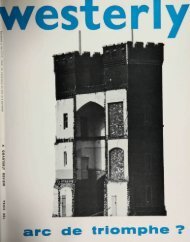QMNQMNQMNQMNapartheid man, this is what this is and this is what a lot of country towns arelike. These people hate Aboriginals and a lot of Aboriginals know this now.Aboriginals comprise some three percent of the Australian population, yetthey occupy some thirty percent of the prison cells. I understand you yourselfspent some time as a youth in various institutions. Why do you think thishas occurred?I think one of the reasons why so many young Aboriginal kids ends up ingaol is because they don't have any stake in the large society around them,that they are treated as separate and are victimized as soon as they areconscious of realising their position, and because they have no stake in thewider society they do stupid things like steal cars and so on. This is happeningall the time and it's still happening.Do you find then that this reflects many of the problems facing Aboriginalyouths today?Well the problems facing Aboriginal youths are or is the sort of underlyingracism in Western Australian society, and Aborigines are very conscious ofthis and so a lot of Aboriginals, especially those who are sensitive or don'tlike it, want to rebel against it. Usually how they do this is by doing somesort of crime and so end up in gaol. It's very difficult for Aboriginals to enterinto white society and accept their values now. One of the things is that, sayin my case and a lot of other Aborigines who were institutionalised, we moreor less learn how to fit into just about any type of situation, especially aninstitution. So that is why we live in a society. Now other Aboriginal peoplehave adjusted in different ways to the white society, like one old guy KingWally, who was sort of famous for his bringing the hunter into an urbansituation like Perth and surviving very well as a hunter and getting moneyby different types of tricks and so on, and he was a perfect example of howan Aborigine can survive in white society without selling out. And this is theproblem - that selling out - that happens to too many Aborigines oncethey get a job, once they get a salary of say twenty five thousand they startfeeling white inside.In your collection of poetry The Song Circle of Jacky you have highlightedthe problems of, the Aborigines in the penal system particularly "Death ofa Poet ': In view of the death in custody of John Patt, Charlie Michael, RobertWalker and others - do you feel that there is such a significance in thetreatment of Aboriginals by the police and prison officers?Well the police are what you consider a sort of colonial force making surethat the Aboriginals don't get out of their place, and don't get too upity, andtherefore any Aboriginals who do start protesting and talk back to policemenend up in gaol and when they go before a judge they usually get longersentences, even for little things. This happens all the time and so Aboriginalprisoners are treated differently. And white people regard the Aborigine asa conquered people, and so if the Aboriginal people stand up for their rightsthey find themselves in fucking Freo.Although you have stated that Wild Cat Falling is not an autobiography -are there parts in the novel that have actually been drawn from your life?Well it's very interesting that question because what happens at the end ofWild Cat Falling is that he looks up into the eyes of a policeman and asks'did that cop really die' and the cop says 'no he didn't' and he feels this rushof gratitude in his heart for not killing the policeman. So when this happenedrecently, and I will get back to it later on, is that because I was at an AboriginalNational Theatre they had a convention in Canberra, and there was so manypeople around, and also I had written a script of Wild Cat Falling based84WESTERLY, No.2, JUNE, 1989
on the novel, then by mixing with all these brilliant Aboriginal people I hadall of these characters and I started re-writing Wild Cat Falling. Naturallyit's changed now but what would have happened if an Aboriginal had shota policeman like he had, he would end up in gaol for so many years, sonaturally I didn't end up in gaol for so many years, so this is not allautobiographical, but bits and pieces are like say the treatment I received atClontarf.Q At or about the time of Wild Cat Falling, you accepted the Buddhismphilosophy as your own, to the extent of spending seven years in India, andbecame a monk. How have your beliefs contributed to Colin Johnson, thewriter, the man, and the Aboriginal?MN Well I regard Buddhism, as I have said before, as the sort of backbone ofmy personality, of my life, and so it is of the utmost importance to me. Thisis one of the reasons why I went to India and South East Asia, to understandthe real Buddhism and then again, Buddhism preaches a great degree oftolerance towards every other faith and so I accept this, but it does not teachyou to accept intolerance.Q Does being a Buddhist conflict in any way with your traditional Aboriginalbeliefs and Aboriginal culture.MN Well, the area around Perth we know as Rainbow Serpent Country, or WoggleCountry, and Buddhism comes over the top of any indigenous belief so itdoesn't interfere, it's a way of salvation or a WErj of life and it does not interferewith any indigenous belief at all, so there is no conflict.Q During your seven years in India how and where did you live?MN Well I lived in Calcutta and then from Calcutta I went to Darjeeling andI had a Tibetan teacher just outside Darjeeling - Caliru Potchei and I spentsome time there and then I went across to Dare Salaam and Dalhousie onthe other side of the Himalayas where as you know Darjeeling is the easternside of the Himalayas and the western side is Dalhousie and also Dare Salaamwhere the Dalai Llama has his government in exile. So I spent some timethere and in my last year in India I was at Sirriup where Buddha preachedhis first sermon and that was next to Banaris.Q Could you give us any insight of the life in a Buddhist monastery in India?MN Well, being a Buddhist Monk is not that strict. It relies on yourself, and youcan make that as strict as you want to or as loose as you want to. But itdoes give you opportunity to live a Buddhist life like a monk, so you canunderstand that aspect of Buddhism, and then you have time to study andtime to meditate, and these things are very important in Buddhism. So youlearn all these things and then by begging in the streets, you understand youhave reliance on other people, that you are not really separated from society,but you have to rely on society to support you and so you can't really doanything wrong because you are becoming a hypocrite, seeing that you arenot repaying society in the proper way.QWhat were some of the problems you had to confront in India, particularlyin relation to the change of life style, cultural values and social structure?MN The one thing about India and that of the position of an Aboriginal inAustralia is really not that much difference in life style. That if you were bornan Aboriginal in Australia at that time, in the I 960s, and went to a placelike India, the sort of level of poverty was more or less similar and againbeing institutionalised in Clontarf and Freo and so on and learning how tofit into such places, there wasn't that much cultural shock and so it was veryeasy. One thing about Indian Society too is that they are segregated into castesand subcastes and so on, so for a person to enter Indian society it is veryWESTERLY, No.2, JUNE, 1989 85
- Page 3 and 4:
CONTENTSWESTERLYVOLUME 34, No.2, JU
- Page 5:
WESTERLYa quarterly reviewISSN 0043
- Page 8 and 9:
JAN KEMPTo My Father, M.H.K.My fath
- Page 10 and 11:
JAN KEMPThe GypsySuddenly before yo
- Page 12 and 13:
WONG PHUI NAMA Death in the WardThe
- Page 14 and 15:
WONG PHUI NAMCousinI had to call to
- Page 16 and 17:
WONG PHUI NAMObitIt is as thin smok
- Page 18 and 19:
So thus I lie here fearful of movem
- Page 20 and 21:
VIRGINIA BERNARDA ValedictionWhen N
- Page 22 and 23:
"Yeah, yeah," I call, returning the
- Page 24 and 25:
she flops for a bit, slurps her tea
- Page 26 and 27:
well her students did, she was neve
- Page 28 and 29:
English or Indian, that they had th
- Page 30 and 31:
ANDREW TAYLORSpringSpring is a dive
- Page 32 and 33:
CAROL SElTZERAiming for the MouthTr
- Page 34 and 35:
GRAEME WILSONA Selection of Japanes
- Page 36 and 37: a highly ambivalent attitude to his
- Page 38 and 39: Esson attended some rehearsals of T
- Page 40 and 41: the literary life of Bloomsbury. Lo
- Page 42 and 43: Without Yeats Esson would quite lik
- Page 44 and 45: "What theatre do you have in Austra
- Page 46 and 47: In the back room Esson could feel t
- Page 48 and 49: "When we started our little theatre
- Page 50 and 51: a screen against a wall. A theatre
- Page 52 and 53: VINCENT O'SULLIVANSinging Mastery:
- Page 54 and 55: flighty relation in most statements
- Page 56 and 57: living and the dead; that places hi
- Page 58 and 59: quite diverse traditions towards th
- Page 60 and 61: WARRICK WYNNEThe Wetlands (for Liam
- Page 62 and 63: JAN OWENSmileOur mother aimed the b
- Page 64 and 65: RICHARD KELLY TIPPINGOlympic Airway
- Page 66 and 67: DAVID REITERBear by the Jasper Road
- Page 68 and 69: (At twenty eight you did not bother
- Page 70 and 71: left, would have risen and walked o
- Page 72 and 73: He had hair like mine used to be, t
- Page 74 and 75: OLIVE PELLThe QuestionTell me how t
- Page 76 and 77: BRIAN MOONANAT 515: MASS LECTURE Th
- Page 78 and 79: PETER KIRKPATRICKTear HereThe bay i
- Page 80 and 81: JOHN WINTERThe Bird ManIn wooded, p
- Page 82 and 83: KNUTE SKINNERAugust 15There's a lig
- Page 84 and 85: M.E. PATTI WALKERThe Hook"Aren't yo
- Page 88 and 89: QMNQMNQMNeasy because you don't bel
- Page 90 and 91: lands or which have been taken over
- Page 92 and 93: GEOFF GOODFELLOWToo MuchDianne is 1
- Page 94 and 95: SHANE McCAULEYSouth Fremantle, Summ
- Page 96 and 97: JEAN KENTWaiting Out the DroughtWai
- Page 98 and 99: STEPHEN MAGEEJesus Falls, South Aus
- Page 100 and 101: SIMON BROWNBlue Hole, Santothe colo
- Page 102 and 103: CONAL FITZPATRICKA Brown Dog, Off A
- Page 104 and 105: PAUL HETHERINGTONOne RoomIn teeming
- Page 106 and 107: society, or, in the terms of the my
- Page 108 and 109: emphasised (I think) in the referen
- Page 110 and 111: Summer Leaves". This continues the
- Page 112 and 113: Deficiency Bill in Western Australi
- Page 114 and 115: invocation of pastoral near the beg
- Page 116 and 117: particularly dreaded). The final re
- Page 118 and 119: VINCENT O'SULLIVAN - is one of New







